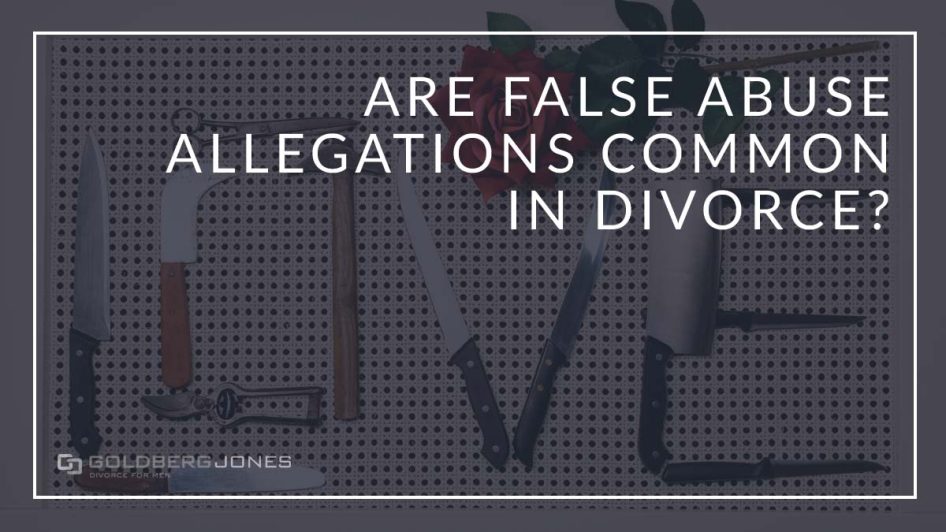Divorce often devolves into heated, contentious screaming matches between bitter, angry spouses, and mudslinging happens frequently. Husbands and wives lob all sorts of accusations at one another, both those founded in reality and those completely fabricated.
Adultery, neglect, and even theft often get tossed around. Perhaps the most heinous of these are abuse allegations, and they have a huge impact on divorce cases.
Are False Abuse Allegations Common In Divorce?
False abuse allegations in divorce cases are a regrettably common occurrence.
One spouse may think that leveling such accusations against the other is advantageous. And too often this assumption proves correct.
What Are Protection Orders?
Protection orders provide safety and security in cases of abuse. In legitimate instances and situations of imminent danger, that’s precisely what they offer: protection. Relatively simple and quick to obtain, this is what makes them effective. It’s also, unfortunately, what makes them all too easy to misuse.
What Evidence is Required To Obtain a Protection Order?
To obtain a protection order, the party who puts forth the abuse allegations has to do little more than just that.
In Washington, a judge can issue a temporary restraining order with a minimum of evidence, often based on nothing beyond one spouse claiming to need one.
Aside from obvious physical altercations or emotional abuse, perceived threats can also result in a protection order. If you and your spouse get into an intense, combative argument, they may go to court and claim to feel threatened. That alone might be enough to issue a temporary order.
Domestic abuse is a serious issue, and no judge wants to fail to protect someone and have a tragedy occur. As a result, the court usually grants these requests.
In these cases of abuse allegations, the defendant doesn’t have the opportunity to defend himself.
These hearings usually happen the day the petition for a protection order is filed, or shortly after that, and are done ex parte. This means the accused isn’t notified of the hearing and won’t be present.
Related Reading: Types of Protection Orders And How They Work
Ways Abuse Allegations Affect Divorce
Abuse allegations, especially those resulting in a protection order, alter the landscape of your divorce. Almost instantly, the case changes dramatically. The ramifications influence how divorce plays out and can last much longer.
Child Custody
When it comes to child custody and visitation, the courts recognize the importance of both parents remaining in a child’s life. Even the non-custodial parents are entitled to frequent and continuing contact with the kids. Cases of abuse and neglect are exceptions to this rule. These claims can be devastating to a parent’s chances of obtaining primary custody or equal parenting time.
Finances
Abuse allegations also often come with a financial burden. A spouse may use a protection order to drive the other out of a home and away from children. This creates costs associated with quickly and unexpectedly having to find a new living situation. Child support and spousal support may also come into play. Then you have legal fees that stack up trying to fight false accusations.
Emotional Distress
Abuse allegations can leave you stunned, feeling helpless, and in serious emotional distress. Even if accusations are proven false, they still change how people look at you, often for a long time to come. Fighting them is exhausting and harrowing, and can lead to depression and despair, all of which leave a mark.
Related Reading: What Is A Guardian Ad Litem?
How To Fight Abuse Allegations
Though it’s exhausting and harrowing, you do have options when it comes to fighting abuse allegations. You may feel vulnerable and exposed, but avenues exist to combat false accusations and limit the damage.
Hire a Lawyer
At this point, if you knew your divorce could become contentious, you probably already have a lawyer. If not, look into it immediately. Experienced counsel will show you what to do, how to defend yourself, and guide you toward an optimal outcome.
Collect Witnesses and Evidence
The best way to prove that your spouse is lying is, well, to prove that your spouse is lying. Collect anything you can that paints you in a positive light, further supports your claims, and invalidates those of the opposition.
Character witnesses; individuals who can testify that your spouse’s accusations are false; texts, voice messages, emails, and any documentation; and people who can provide an alibi, all of these support your cause.
Stay Calm
Staying calm and composed during hearings goes a long way toward helping your case. Nothing makes you seem unstable or capable of doing harm like explosive outbursts in court.
No matter what the other side says, no matter how unfounded the claims, react in an even, ordered fashion. Don’t interrupt, don’t laugh or sneer, and don’t show a lack of control. Do what you must to create a positive impression.
Show a Pattern of Behavior
Did your spouse threaten abuse allegations before? Or mention a plan to do something like this? If so, and if you can show it—through texts, emails, witness testimony, and the like—that helps discredit the allegations and strengthen your position.
Protection orders have an important, legitimate use, to keep people safe. It’s too bad when people misuse them to gain an undue advantage in a divorce. Even if the accusations are untrue, they can still have a substantial negative impact on your case. It’s important to react quickly and decisively in these situations to counter and hopefully dismiss any false claims.
Other Reading: Can You Modify Child Support Payments?
